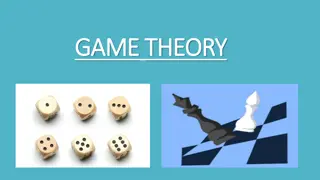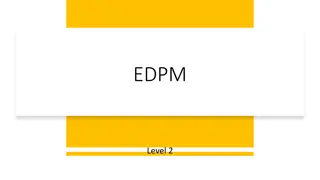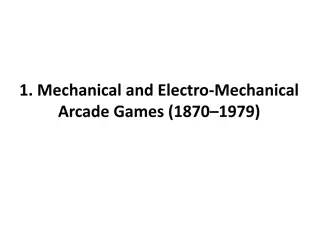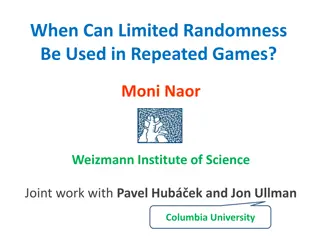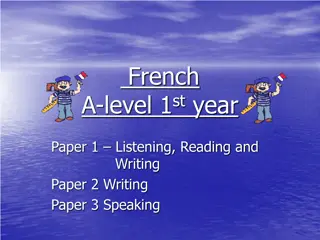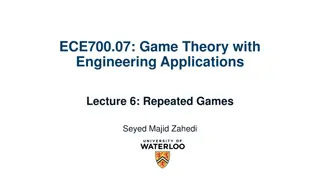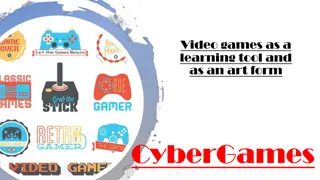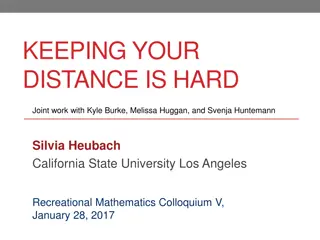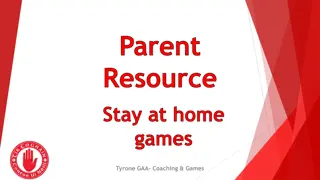Lessons from the World of Paper Games
The concepts of luck, skill, and hidden information in paper games, delving into the interplay between uncertainty and outcome. Discover how luck and skill intersect, shaping gameplay dynamics across various game genres.
Download Presentation

Please find below an Image/Link to download the presentation.
The content on the website is provided AS IS for your information and personal use only. It may not be sold, licensed, or shared on other websites without obtaining consent from the author.If you encounter any issues during the download, it is possible that the publisher has removed the file from their server.
You are allowed to download the files provided on this website for personal or commercial use, subject to the condition that they are used lawfully. All files are the property of their respective owners.
The content on the website is provided AS IS for your information and personal use only. It may not be sold, licensed, or shared on other websites without obtaining consent from the author.
E N D
Presentation Transcript
Luck, Skill, and Hidden Information Lessons from the World of Paper Games K. Robert Gutschera Senior Game Designer The Amazing Society krg@amazingsociety.com GDC Canada May 2009 Joint work with Richard Garfield and Skaff Elias
Outline What is Luck? Luck vs. Skill Sources of Luck Pros & Cons of Luck Hidden Information
Defining Luck For our purposes, luck (or randomness) in a game is uncertainty in outcome. So all games have some luck. Not necessarily coming from dice, cards, random number generators, etc.
Even Chess Has Luck Outcome of a chess game is uncertain. Elo measures it. E.g. if my rating is 1800 and yours is 1870, you have a ~60% chance to win.
Randomly Beating Kasparov For an extreme case, consider trying to beat Kasparov by playing randomly. Chance to win: 1 in 30^50. Win NY lottery 7 times: 1 in (60^6)^7, about the same. A very small chance chess has less luck than other games.
Example: Die-Rolling Chess Two players compete by rolling 1 die. 1-2: first player wins 3-4: second player wins 5-6: play chess All the skill of chess, but a lot more luck.
Luck vs. Skill Luck and skill aren t opposites; they re orthogonal. low skill high skill low luck tic-tac-toe chess high luck slots poker
And Yet Surely there s some relationship between luck and skill. What is it?
The Skill Chain Consider a chain of players, each beating the next 60% of the time: A B C wins 60% vs. wins 60% vs. wins 60% vs. wins 60% vs. What does the length of this chain measure?
The Skill Chain, II This is just Elo! For chess, the length is about 30. But for die-rolling chess, it s about 10 (harder to win 60% of the time!) Adding luck compresses the skill chain!
Connecting Skill and Luck Chain seems to measure skill (more skill => longer chain) But in fact measures returns to skill. And so, very roughly: Returns to Skill = Skill Luck
Sources of Luck Explicit randomizers (cards, dice, RNGs) Simultaneous choices (e.g. RPS) Human ignorance Combinatorial (e.g. chess) Deliberate secrets (e.g. xword puzzles)
Luck: the Good Increased range of competition Something to blame losses on Increased variety of gameplay Catchup mechanism Adds psychological interest
Luck: the Bad Luck can be confusing. People are bad at probability Randomness can conceal feedback needed to learn a game s strategy People like to feel they are masters of their own fate. Historically, though, people tend to prefer games with more luck.
Luck: the Ugly Experienced players may dislike luck because they think they ll win more if the game has less. This is both true and false. Designers are experienced, thus prone to this trap. Sometimes you should listen but sometimes you shouldn t.
Hidden Information Things players don t know: Private info One knows, others don t. Special case: No players know, i.e. uncertainty, i.e. luck!
Luck & Hidden Information Any source of luck is a source of HI (the special case ). Some kind of luck is needed to generate hidden information. Sometimes private information generates luck (e.g. RPS). So the pros & cons of hidden information are very similar to those of luck.
Luck: One More Good Luck, especially private info, can control calculation by decreasing the rewards to calculation. Examples: die rolls in minis vs. chess random damage in an RTS dummy in bridge (reverse e.g.) secret victory points in German board games
Luck Players Will Accept Simultaneous choices, private info tend to be accepted over explicit randomizers. Pre-plan luck over post-plan luck . Entrenched audiences are tough. New platforms are an opportunity.
Conclusion More luck doesn t mean less skill! Adding luck to a game can be a good thing. How you add it, and who your audience is, can make all the difference. Questions? krg@amazingsociety.com

 undefined
undefined








